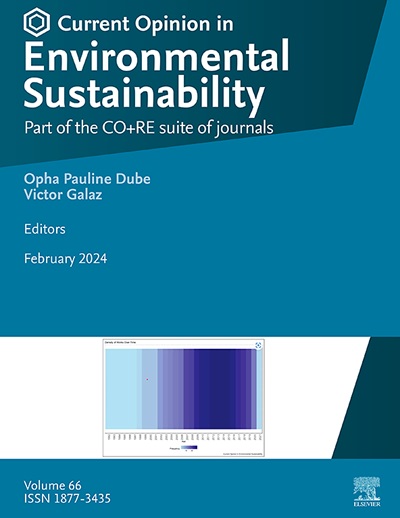Defining and operationalizing ‘nature-positive’ — a question of power
IF 6.3
2区 环境科学与生态学
Q1 ENVIRONMENTAL SCIENCES
Current Opinion in Environmental Sustainability
Pub Date : 2025-10-09
DOI:10.1016/j.cosust.2025.101581
引用次数: 0
Abstract
This paper examines how the concept ‘nature-positive’ as a means to enhance biodiversity is defined and used, viewed through the lens of power. Building on a three-dimensional conceptualization of power, we elaborate on i) how ‘nature-positive’ enters and remains on business and policy agendas, ii) different interpretations from both ecological and business perspectives, and iii) the governance of its implementation. Our findings reveal divergent positions, where some argue for a clear and operational definition that makes the concept practical for business and enforceable in legal frameworks. Others adopt a more critical standpoint, viewing it as a boundary object that facilitates processes encouraging positive actions. At the same time, yet other voices regard it as a distraction from addressing the structural drivers of biodiversity loss. We conclude that, from a normative standpoint, an open and ideally balanced debate would empower multiple voices and interpretations. Reflecting on who stands to benefit from different operationalizations is important from a justice perspective. For ‘nature-positive’ to serve as a driver of transformative change, it must be underpinned by a robust toolkit capable of addressing the complexity of biodiversity and its multiple values.
定义和实施“自然积极”——一个权力问题
本文从权力的角度考察了如何定义和使用“自然积极”这一概念作为增强生物多样性的手段。在权力的三维概念的基础上,我们详细阐述了1)“自然积极”如何进入并保持在商业和政策议程上,2)从生态和商业角度的不同解释,以及3)其实施的治理。我们的研究结果显示了不同的立场,一些人主张一个明确的、可操作的定义,使这个概念在商业上可行,并在法律框架中可执行。其他人则采取更为批判的立场,将其视为促进鼓励积极行动的过程的边界对象。与此同时,还有一些声音认为,这分散了人们对解决生物多样性丧失的结构性驱动因素的注意力。我们的结论是,从规范的角度来看,公开和理想平衡的辩论将赋予多种声音和解释。从公正的角度来看,反思谁将从不同的操作中受益是很重要的。要使“自然积极”成为变革性变革的驱动力,必须以能够解决生物多样性复杂性及其多重价值的强大工具包为基础。
本文章由计算机程序翻译,如有差异,请以英文原文为准。
求助全文
约1分钟内获得全文
求助全文
来源期刊

Current Opinion in Environmental Sustainability
ENVIRONMENTAL SCIENCES-ENVIRONMENTAL SCIENCES
CiteScore
13.80
自引率
2.80%
发文量
52
审稿时长
6-12 weeks
期刊介绍:
"Current Opinion in Environmental Sustainability (COSUST)" is a distinguished journal within Elsevier's esteemed scientific publishing portfolio, known for its dedication to high-quality, reproducible research. Launched in 2010, COSUST is a part of the Current Opinion and Research (CO+RE) suite, which is recognized for its editorial excellence and global impact. The journal specializes in peer-reviewed, concise, and timely short reviews that provide a synthesis of recent literature, emerging topics, innovations, and perspectives in the field of environmental sustainability.
 求助内容:
求助内容: 应助结果提醒方式:
应助结果提醒方式:


